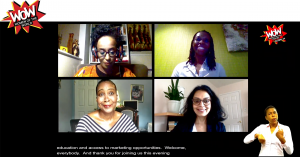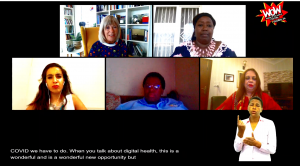mothers2mothers Joins Health Activists at WOW Global 24
On Saturday 27 June, mothers2mothers (m2m) was delighted to join the timely and important discussions of the WOW Global 24 Festival – the first ever free 24-hour online festival uniting women and girls across the world. m2m was represented by Spokeswoman Colile Mashaba from South Africa and Mozambique Country Director, Ilda Kuleba, who joined fellow female leaders in thought-provoking panels. They discussed and analysed the health challenges faced by women and girls in their communities and countries, how these have been heightened by COVID-19, and how m2m is providing lifesaving and sustainable solutions.

Chaired by Leyla Hussein, Ilda discussed women’s health challenges with Devida Davison from the U.S. and Neena Prasad, from Canada.
Running across all time zones over 24 hours, WOW Global 24 offered participants a moment of reflection and discussion to respond to the world’s current events, including racial injustice and the disproportionate impact the pandemic is having on women and girls, particularly those already marginalised. Ilda and Colile were in excellent company —also speaking at the Festival were individuals such as Phumzile Mlambo-Ngcuka(United Nations Under-Secretary-General and Executive Director of UN Women), actress Thandie Newton, and Her Royal Highness The Duchess of Cornwall.
Here is a collection of Ilda’s and Colile’s key moments.
How is COVID-19 affecting communities and women?
Colile: “South Africa has become the epicentre of #COVID19 in Africa with over 100,000 cases*—women and girls are bearing the brunt, financially and health-wise. It’s been harder for people in my community to go to health clinics because there is fewer, or no, transportation. Unemployment and gender-based violence are on the rise. It is also difficult for individuals living with HIV to take their medication in private during lockdown, especially if they have not disclosed their status to their family and friends, because everyone is at home. Women living with HIV are really struggling to access lifesaving treatment because of all these factors.”
Ilda: “Women are disproportionately affected by health-issues as it is, especially HIV. In Mozambique, 2.2M people are living with HIV – and 58% of that number are women. Only a small fraction are on treatment. Unless we make sure that these women know their status, and start and stick to their treatment if they test positive, we will not achieve our goal of a generation free from HIV. That is why the role of the Mentor Mother is so crucial—as local women from the community, who have a strong understanding of the everyday realities and who have had a similar health journey, they are best placed to ensure that women are still linked to health services, at a time when they need it the most.
But COVID-19 has compounded all of these challenges. UNAIDS estimates 500,000 extra deaths if HIV-services are disrupted for six months due to COVID–19, undoing over 10 years of progress. COVID-19 is really just the tip of the iceberg, worsening existing inequalities—and women will be the most affected. We can’t leave them behind.”
How can we assist women and girls and how can we keep them safe?
Ilda: “We need more peer-led, community-based interventions—like m2m’s Mentor Mother model—that allow us to understand the challenges that are going on in our communities. The solutions need to come from the communities in order for us to best serve these women. We need to make sure that those who are on the ground and have the experience are being brought to the forefront, are talking about it, and are listened to.”

Colile’s panel was chaired by Founder and Director of the WOW Foundation Jude Kelly. Her fellow speakers included Professor Agnes Binagwabo from Rwanda, Dr. Yasmeed Qazi from Pakistan, and Sonia Adesara, from the U.K.
Colile: “We are planning ahead to make sure we are in a better place in the future if something like this happens again. We have new and better tools so we can work virtually with our clients even if we cannot go to see them 1-1. We’re using technology and phones to make sure women still get the health services they need. We have to adapt the way we work.”
Are there solutions you are starting to feel optimistic about? What gives you hope?
Colile: There are solutions, and we need to work as a team. At m2m, we do household visits, we work in health facilities, we work hand-in-hand with different partners—we discuss challenges together and work out how we can better assist women and girls.“
Ilda: What gives me hope is the resilience I see in my team of Mentor Mothers and the women I work with. We know our model works and that is because it is peer-led and community-based. As an organisation, we are building a more gender equal and inclusive world, where African women have a voice, so that they can make decisions on their health and their bodies. We must continue to put women at the centre of their own health choices.”
Watch the full discussions here and follow us on social media to make sure you’re kept up to date with m2m’s upcoming events and conversations!
- Colile speaking in the Health Part 1 panel – Snapshots Of Health and Hope (from 4h15min onwards)
- Ilda sharing her insights in the Health Part 2 panel – Health Activism (from 4hrs8m onwards)
*As of 13 July 2020, that number had now risen to almost 300,000 cases.






















